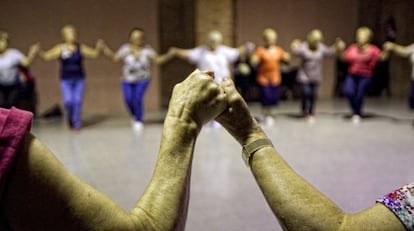Time banks becoming popular as means of circumventing crisis
Spain has a network of around 300 groups that allow people to swap services

Belén Giner has never been much good at home improvement work, so she had to get someone round to install a fan to help her get through the heat of the Barcelona summer. How much did the installation cost? Nothing. She paid for it with a few hours of giving meditation and relaxation classes through a time bank in Barcelona’s Gràcia neighborhood of which she has been a member for a number of years.
“It helps me to save money when I need repairs done,” she says. “I’ve got the boiler broken now and I’m waiting for someone to come and repair it. And since I work for myself, I got another member of the bank to set up a website for my business.”
For most people, an hour is 60 minutes. But for members of a time bank, 60 minutes is also a form of currency that can be used to swap services within a community. There are about 300 time banks in Spain, with 40,000 members forming an alternative economy, according to figures from the Association for the Development of Time Banks (ADBdT) and Julio Gisbert, the author of the book Vivir sin empleo (Living without a job), and of the blog of the same name.
“It would be ideal if there wasn’t any form of money, not even time money. It’s a question of extending the solidarity network that exists between friends and family members to the neighborhood and the community closest to each of us. If we have skills, it’s important that we help each other using them,” explains Sergi Alonso, the chairman of ADBdT and a member of the Gràcia time bank that has been on the go since 2004, as well as the one he has just set up in Sant Celoni, Barcelona province.
It’s a question of extending the solidarity network that exists between friends and family members to the neighborhood"
The type of services exchanged varies greatly, encompassing everything from home repairs to cookery classes, looking after animals during vacations, help moving house, legal advice, language classes and taking care of elderly people, among others.
“What’s revolutionary about this is that the hours that serve as a currency are the same as the hours of the clock. What you are willing to give is paid to you at the same price, that is to say with the same number of hours,” says ADBdT’s Alonso. “The services that are offered in time banks should not be confused with voluntary work; it is more like an exchange between equals. That is the key to it.”
Gisbert categorizes the different initiatives that exist within the alternative economy. “Barter, time banks and social money networks are inclusive systems that favor those without resources,” he says. “The fact that you are unemployed does not have to be an obstacle to being able to live with dignity.” Gisbert points to the word prosumer, a neologism that combines the words producer and consumer to explain the new concept.
Technological advances have facilitated the spread of time banks and swap networks on the internet. ADBdT has created free software called Timeoverflow to help set up time bank websites. “Using this platform, it will be easier for users of a time bank to know what each member is offering,” he says. However, he insists that it is important for members of such communities to physically meet up from time to time.
Cronobank is the first global time bank. It can be accessed in 55 languages and is taking off rapidly among Spanish speakers. “We want this also to be a meeting place as well as a time bank,” says its founder Sergio García. “It’s a means of bringing an alternative economy nearer and making us realize that what makes us happy is not how much money we have.”
Cronobank has been on the go for eight months and already has 1,500 users. One of its innovations, which will be made available from February, is its Caring Economy Fridays, a weekly web meeting in which experts on alternative economies answer questions.
Tu suscripción se está usando en otro dispositivo
¿Quieres añadir otro usuario a tu suscripción?
Si continúas leyendo en este dispositivo, no se podrá leer en el otro.
FlechaTu suscripción se está usando en otro dispositivo y solo puedes acceder a EL PAÍS desde un dispositivo a la vez.
Si quieres compartir tu cuenta, cambia tu suscripción a la modalidad Premium, así podrás añadir otro usuario. Cada uno accederá con su propia cuenta de email, lo que os permitirá personalizar vuestra experiencia en EL PAÍS.
¿Tienes una suscripción de empresa? Accede aquí para contratar más cuentas.
En el caso de no saber quién está usando tu cuenta, te recomendamos cambiar tu contraseña aquí.
Si decides continuar compartiendo tu cuenta, este mensaje se mostrará en tu dispositivo y en el de la otra persona que está usando tu cuenta de forma indefinida, afectando a tu experiencia de lectura. Puedes consultar aquí los términos y condiciones de la suscripción digital.









































